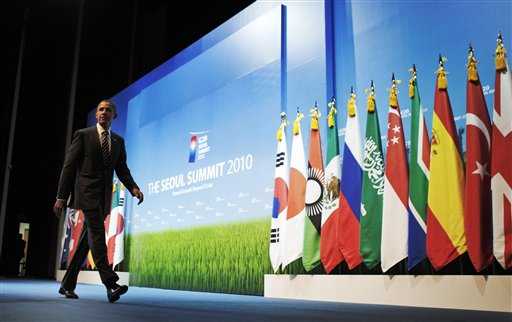This originally appeared at RobertReich.org
The president emerged today from a meeting with the heads of state and finance ministers of the 20 biggest economies, in Seoul, South Korea, saying they had agree to “get the global economy back on the path of recovery.”
But where are the specifics? The three-page communique that also emerged from the session brims with bromides about the importance of “rebalancing” the global economy, “coordinating” policies, and refraining from “competitive devaluations.”
All nice, but not a single word of agreement from China about revaluating the yuan, or from the United States about refraining from further moves by the Fed to flood the U.S. economy with money (thereby reducing interest rates, causing global investors to look elsewhere for higher returns, and lowering the value of the dollar).
China and the U.S. are the only big players in the currency game. And with neither of them stepping up to bat, the game is in dangerous territory. Other nations will now do whatever they can to reduce the value of their currencies in order to stimulate more exports — and therefore create more jobs.
The underlying problem isn’t just or even mainly an international imbalance. It’s an imbalance within many nations — especially inside the United States and China. In the U.S., more and more income is concentrating at the top, thereby reducing the relative purchasing power of the vast American middle class. That means more pressure on exports to fill the gap.
In China, more and more income is going to the productive sector of its huge economy rather than to Chinese consumers, thereby reducing the relative purchasing power of the Chinese relative to what the nation is producing. That means more pressure on exports to fill the gap.
It’s always nice to talk about international cooperation, and to create global photo ops. But the truth is much more needs to be done to ease tensions that are moving the global economy closer to the brink of outright protectionism. The key responsibility falls to China and America — both in terms of what they do internationally and also what they do domestically.
Both have failed.

